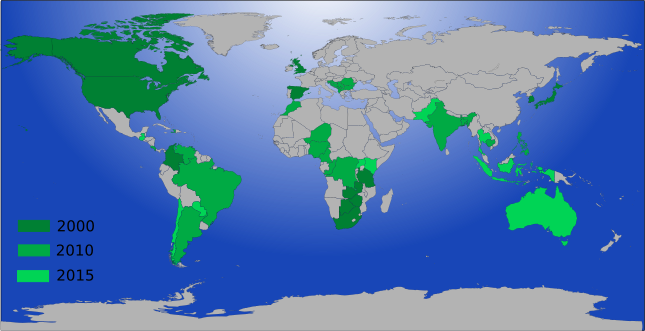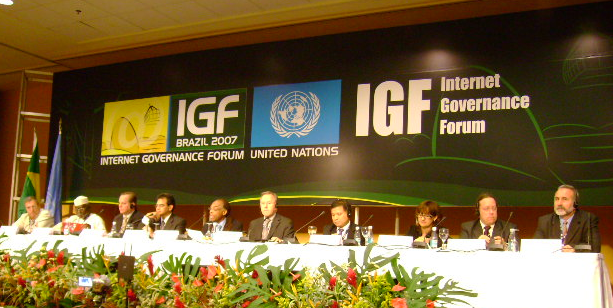|
World Summit On The Information Society
The World Summit on the Information Society (WSIS) was a two-phase United Nations-sponsored summit on information, communication and, in broad terms, the information society that took place in 2003 in Geneva and in 2005 in Tunis. WSIS Forums have taken place periodically since then. One of the Summit's chief aims is to bridge the global digital divide separating rich countries from poor countries by increasing internet accessibility in the developing world. The conferences established 17 May as World Information Society Day. The WSIS+10 Process marked the ten-year milestone since the 2005 Summit. In 2015, the stocktaking process culminated with a High-Level meeting of the UN General Assembly on 15 and 16 December in New York. A WSIS+20 review will take place in July 2025 in Geneva. Background In the last decades of the 20th century, Information and Communications Technology (ICT) has changed modern society in many ways. This is often referred to as the digital revolution, an ... [...More Info...] [...Related Items...] OR: [Wikipedia] [Google] [Baidu] |
ONU Geneva Mainroom
ONU may refer to: * United Nations The United Nations (UN) is the Earth, global intergovernmental organization established by the signing of the Charter of the United Nations, UN Charter on 26 June 1945 with the stated purpose of maintaining international peace and internationa ... in other languages, e.g. French ''Organisation des Nations Unies'', Spanish ''Organización de las Naciones Unidas'' and Portuguese ''Organização das Nações Unidas'' * Olivet Nazarene University * Ohio Northern University * Optical Network Unit, the IEEE term for Optical Network Terminal * Order of Nunavut * Organizacion de Narcotraficantes Unidos, a Puerto Rican criminal organization * Onu (pronoun), Polish neopronoun {{disambig ... [...More Info...] [...Related Items...] OR: [Wikipedia] [Google] [Baidu] |
Millennium Development Goals
In the United Nations, the Millennium Development Goals (MDGs) were eight international development goals for the year 2015 created following the Millennium Summit, following the adoption of the United Nations Millennium Declaration. These were based on the OECD DAC International Development Goals agreed by Development Ministers in the "Shaping the 21st Century Strategy". The Sustainable Development Goals (SDGs) succeeded the MDGs in 2016. All 191 United Nations member states, and at least 22 international organizations, committed to help achieve the following Millennium Development Goals by 2015: # To eradicate extreme poverty and hunger # To achieve universal primary education # To promote gender equality and empower women # To reduce child mortality # To improve maternal health # To combat HIV/AIDS, malaria, and other diseases # To ensure environmental sustainability # To develop a global partnership for development [...More Info...] [...Related Items...] OR: [Wikipedia] [Google] [Baidu] |
Association For Progressive Communications
The Association for Progressive Communications (APC) is an international network of organizations that was founded in 1990 to provide communication infrastructure, including Internet-based applications, to groups and individuals who work for peace, human rights, Environmental movement, protection of the environment, and sustainability. Pioneering the use of Information technology, ICTs for civil society, especially in developing countries, APC were often the first providers of Internet in their member countries. APC is a worldwide network of social activists who use the internet to make the world a better place. APC is both a network and an organisation. APC members are groups working in their own countries to advance the same mission as APC. APC has more than 59 members, mostly in Asia, Africa and Latina America, from five continents. This is a challenge and a strength, because members are at the two extremes of internet development (members in South Korea with incredible connecti ... [...More Info...] [...Related Items...] OR: [Wikipedia] [Google] [Baidu] |
Internet Governance Forum
The Internet Governance Forum (IGF) is a multistakeholder governance group for policy dialogue on issues of Internet governance. It brings together all stakeholders in the Internet governance debate, whether they represent governments, the private sector or civil society, including the technical and academic community, on an equal basis and through an open and inclusive process."About the Internet Governance Forum" , Internet Governance Forum. Retrieved 14 April 2015. The establishment of the IGF was formally announced by the Secretary-General in July 2006. It was first convened in October–November 2006 and has held an annual meeting since then. History and devel ...
|
Tunis Agenda For The Information Society
The Tunis Agenda for the Information Society was a consensus statement of the World Summit on the Information Society, adopted on November 18, 2005 in Tunis, Tunisia. It called for the creation of the Internet Governance Forum and a novel, lightweight, multistakeholder governance structure for the Internet The Internet (or internet) is the Global network, global system of interconnected computer networks that uses the Internet protocol suite (TCP/IP) to communicate between networks and devices. It is a internetworking, network of networks .... See also * Tunis Commitment References External links Tunis Agenda for the Information Society International Telecommunication Union {{Internet-stub ... [...More Info...] [...Related Items...] OR: [Wikipedia] [Google] [Baidu] |
Tunis Commitment
The Tunis Commitment was a consensus statement of the World Summit on the Information Society, adopted on November 18, 2005, in Tunis, Tunisia. See also *Tunis Agenda for the Information Society The Tunis Agenda for the Information Society was a consensus statement of the World Summit on the Information Society, adopted on November 18, 2005 in Tunis, Tunisia. It called for the creation of the Internet Governance Forum and a novel, ligh ... References External linksTunis Commitment(pdf). International Telecommunication Union {{tunisia-stub ... [...More Info...] [...Related Items...] OR: [Wikipedia] [Google] [Baidu] |
2005
2005 was designated as the International Year for Sport and Physical Education and the International Year of Microcredit. The beginning of 2005 also marked the end of the International Decade of the World's Indigenous Peoples, International Decade of the World's Indigenous People (1995–2005). Events January * January 1 – Jeanna Giese from Wisconsin, United States, comes home from the hospital and officially becomes the first person to ever survive rabies without a vaccination. * January 5 – Eris (dwarf planet), Eris, the most massive known dwarf planet in the Solar System, is discovered by a team led by Michael E. Brown using images originally taken on October 21, 2003, at the Palomar Observatory. * January 9 – The Comprehensive Peace Agreement is signed, ending the Second Sudanese Civil War in Sudan. * January 12 – Deep Impact (spacecraft), ''Deep Impact'' is launched from Cape Canaveral with the purpose of studying the comet Tempel 1. * January 14 – The Huyg ... [...More Info...] [...Related Items...] OR: [Wikipedia] [Google] [Baidu] |
E-science
E-Science or eScience is computationally intensive science that is carried out in highly distributed network environments, or science that uses immense data sets that require grid computing; the term sometimes includes technologies that enable distributed collaboration, such as the Access Grid. The term was created by John Taylor, the Director General of the United Kingdom's Office of Science and Technology in 1999 and was used to describe a large funding initiative starting in November 2000. E-science has been more broadly interpreted since then, as "the application of computer technology to the undertaking of modern scientific investigation, including the preparation, experimentation, data collection, results dissemination, and long-term storage and accessibility of all materials generated through the scientific process. These may include data modeling and analysis, electronic/digitized laboratory notebooks, raw and fitted data sets, manuscript production and draft versions, pre ... [...More Info...] [...Related Items...] OR: [Wikipedia] [Google] [Baidu] |
E-health
eHealth describes healthcare services which are supported by digital processes, communication or technology such as electronic prescribing, Telehealth, or Electronic health record, Electronic Health Records (EHRs). The term "eHealth" originated in the 1990s, initially conceived as "Internet medicine," but has since evolved to have a broader range of technologies and innovations aimed at enhancing healthcare delivery and accessibility. According to the World Health Organization (WHO), eHealth encompasses not only internet-based healthcare services but also modern advancements such as artificial intelligence, mHealth (mobile health), and telehealth, which collectively aim to improve accessibility and efficiency in healthcare delivery. Usage of the term varies widely. A study in 2005 found 51 unique definitions of eHealth, reflecting its diverse applications and interpretations. While some argue that it is interchangeable with health informatics as a broad term covering electronic/ ... [...More Info...] [...Related Items...] OR: [Wikipedia] [Google] [Baidu] |
E-learning
Educational technology (commonly abbreviated as edutech, or edtech) is the combined use of computer hardware, software, and educational theory and practice to facilitate learning and teaching. When referred to with its abbreviation, "EdTech", it often refers to the industry of companies that create educational technology. In ''EdTech Inc.: Selling, Automating and Globalizing Higher Education in the Digital Age'', Tanner Mirrlees and Shahid Alvi (2019) argue "EdTech is no exception to industry ownership and market rules" and "define the EdTech industries as all the privately owned companies currently involved in the financing, production and distribution of commercial hardware, software, cultural goods, services and platforms for the educational market with the goal of turning a profit. Many of these companies are US-based and rapidly expanding into educational markets across North America, and increasingly growing all over the world." In addition to the practical educational ... [...More Info...] [...Related Items...] OR: [Wikipedia] [Google] [Baidu] |
E-business
Electronic business (also known as online business or e-business) is any kind of business or commercial activity that includes sharing information across the internet. Commerce constitutes the exchange of products and services between businesses, groups, and individuals; and can be seen as one of the essential activities of any business. E-commerce focuses on the use of ICT to enable the external activities and relationships of the business with individuals, groups, and other organizations, while e-business does not only deal with online commercial operations of enterprises, but also deals with their other organizational matters such as human resource management and production. The term "e-business" was coined by IBM's marketing and Internet team in 1996. Market participants in electronic business Electronic business can take place between a very large number of market participants; it can be between business and consumer, private individuals, public administrations, or any ot ... [...More Info...] [...Related Items...] OR: [Wikipedia] [Google] [Baidu] |





